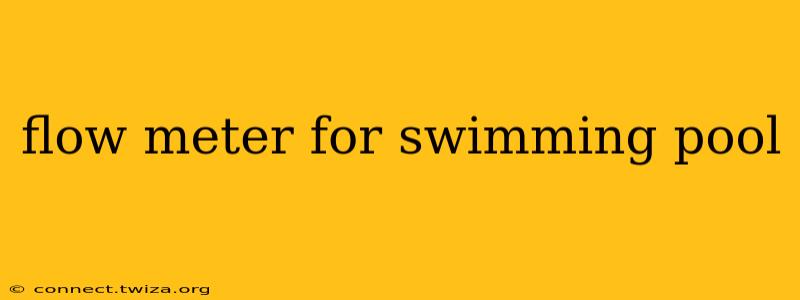Maintaining a pristine and efficiently functioning swimming pool requires diligent monitoring of various factors, and water flow is paramount. A flow meter for a swimming pool plays a crucial role in ensuring proper filtration, chemical balance, and overall system health. This guide will delve into the different types of flow meters, their applications, and considerations for selecting the right one for your pool.
What is a Swimming Pool Flow Meter?
A swimming pool flow meter is a device that measures the volume of water passing through your pool's filtration system per unit of time, typically expressed in gallons per minute (GPM) or liters per minute (LPM). This measurement provides critical insights into the efficiency of your pool's circulation and filtration, alerting you to potential problems before they escalate. Accurate flow rate monitoring ensures consistent water treatment and prevents equipment damage.
Types of Flow Meters for Swimming Pools
Several types of flow meters are suitable for swimming pool applications, each with its own advantages and disadvantages:
1. Turbine Flow Meters:
These meters utilize a small turbine that spins proportionally to the water flow rate. The rotation speed is then translated into a flow rate reading. Turbine meters are generally accurate and relatively inexpensive, making them a popular choice for residential pools. However, they can be susceptible to clogging from debris, requiring regular maintenance.
2. Paddlewheel Flow Meters:
Similar to turbine meters, paddlewheel meters use a paddlewheel to measure flow rate. However, they are typically less expensive and more resistant to debris than turbine meters. Their accuracy might be slightly lower compared to turbine meters, but they are often sufficient for many pool applications.
3. Magnetic Flow Meters:
These meters operate using Faraday's Law of Induction. A magnetic field is applied across the pipe, and the voltage generated is proportional to the flow rate. Magnetic flow meters are highly accurate and can handle a wide range of flows, but they are more expensive than other types. They are also less susceptible to clogging. They are less common in residential applications due to cost.
4. Ultrasonic Flow Meters:
Ultrasonic meters use sound waves to measure the flow rate. They are non-invasive, meaning they don't require cutting into the pipe. This makes them ideal for existing systems where installation is challenging. Ultrasonic meters are highly accurate but generally more expensive than mechanical meters.
How to Choose the Right Flow Meter for Your Pool
Selecting the appropriate flow meter depends on several factors:
- Pool Size: Larger pools generally require flow meters with a higher flow rate capacity.
- Budget: Flow meters range in price from relatively inexpensive to quite costly.
- Accuracy Requirements: The level of accuracy needed will influence your choice. For most residential pools, a moderately accurate meter is sufficient.
- Ease of Installation and Maintenance: Consider the complexity of installation and the ease of maintenance when selecting a meter.
- Type of Pool Plumbing: The diameter of your pool's plumbing will dictate the size and type of meter needed.
Why is a Flow Meter Important for My Pool?
Maintaining the correct flow rate is essential for several reasons:
- Efficient Filtration: A properly functioning filtration system removes debris and contaminants from your pool water. An inadequate flow rate will result in poor filtration and cloudy water.
- Chemical Balance: The flow rate impacts the effectiveness of pool chemicals. Insufficient flow can lead to uneven chemical distribution and potential imbalances.
- Equipment Protection: Maintaining the correct flow rate protects your pool pump and filter from damage caused by overworking or underworking.
- Energy Savings: Optimized flow rates minimize the energy consumption of your pool pump.
What are the signs of a problem with my pool's flow rate?
Several signs indicate problems with your pool's flow rate:
- Cloudy Water: This often indicates insufficient filtration due to low flow.
- Poor Chemical Balance: Difficulty maintaining proper chemical levels can point to issues with water circulation and flow.
- Overheating Pump: A pump struggling to maintain flow rate might overheat and potentially fail.
- Inconsistent Filtration: Noticeably inconsistent filtration performance suggests flow rate issues.
How often should I check my pool's flow rate?
Ideally, you should check your pool's flow rate regularly, at least once a month or more frequently if you notice any issues. This allows you to proactively address potential problems before they become major issues.
Can I install a flow meter myself?
While some simpler flow meters might be relatively easy to install, others require specialized plumbing skills. If you're unsure, it's always best to consult a qualified pool professional.
This comprehensive guide provides an overview of flow meters for swimming pools. Remember to consider your specific needs and budget when making your selection to ensure the optimal performance and longevity of your pool.
